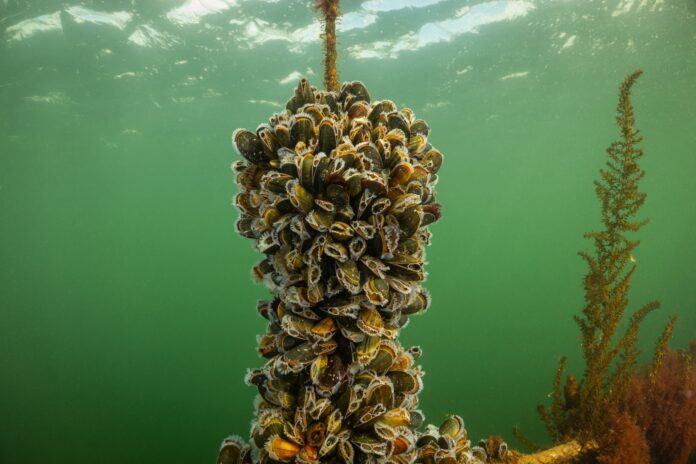They are trialling an early warning system to safeguard marine mammals against ‘farms’ that use ropes to grow mussels
Vodacom South Africa and the World Wide Fund for Nature (WWF) South Africa have teamed up to pilot solutions to safeguard marine mammals against entanglements.
This work is underway in Saldanha Bay, on South Africa’s West Coast, where traditional fishing communities are struggling with problems caused by overfishing, pollution and climate change.
They have developed a sustainable in the shape of off-shore, rope-grown mussel farms which provide both a low-impact, protein-rich source of seafood plus employment and economic development. However, there is a risk of marine mammals, including whales, becoming entangled in the ropes.
A tech solution?
Vodacom, in partnership with WWF South Africa, are using cameras and hydrophones to alert mussel farmers to whales in the Saldanha Bay Aquaculture Development Zone (SBADZ) and activate the ADZ Incident and Emergency Response Protocol in the case of an entanglement.
WWF says whales play a vital role in the overall health of the marine environment, helping to capture carbon from the atmosphere. Estimates are that each great whale sequesters 33 tons of CO2 on average, but six out of the 13 great whale species are classified as endangered or vulnerable, despite decades of protection.
Other uses
The early warning system will also be used to gather scientific data, recording movement of marine life and could help to prevent ships striking other superpods, such as seals and dolphins. Once the pilot project is concluded, the solution could be expanded to other coastal areas and fisheries.
Digital technology already plays a role in the sustainable seafood supply chain and ocean stewardship. Vodacom and the WWF are collaborating to develop digital tools to support the WWF Southern African Sustainable Seafood Initiative (WWF-SASSI). The initiative is intended to foster conservation through promoting the consumption of sustainable seafood and education about the ocean.
Education, education, education
For example, WWF-SASSI Fish ID digital platform helps consumers and those in the seafood industry to make informed choices about seafoods, such as farmed mussels on the SASSI green list.
Vodacom says, “This educational approach is also being rolled out to young people to encourage the next generation to be more environmentally conscious towards our oceans. It has been further enhanced by the inclusion of an Early Childhood Development centre and Secondary School in Saldanha Bay that will now form part of Vodacom’s education ecosystem.”
Coastal care
Pavitray Pillay, WWF-SASSI Manager, WWF South Africa, says, “Rope-grown mussels are a fantastic source of sustainable seafood. All efforts to ensure that this industry remains on our WWF-SASSI green list are to be welcomed.
“We are delighted that Vodacom has chosen to put the time, efforts and resources into this pilot project which has great potential to scale elsewhere in other Aquaculture Development Zones around the coast.”



